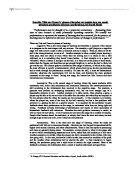Autonomous stage
-This is the stage when the performer is able to perform the skill with little or no conscious thought. At this level the performer can start to think about enhancing the skill, to make it harder for an opponent for example. Tennis serve putting spin on the ball, Or they can think ahead to how the other player may react to the serve.
Tennis Serve
A structured practice to help improve a sports performance such as tennis could be to improve the serve. The performer will practice the skill through the three learning phases.
In the cognitive phase I would try to build up a mental image of the skill to the performer. To do this I would use specific types of guidance aids mostly visual aids. These would include pictures, and video footage of the skill being performed by professionals. This is so they could see how the skill is supposed to be executed. The next part of the practice would be to carry out the skill, which is related to the associative phase. Using a command style teaching method, with a coach who can perform the skill would be the best idea. This would allow the coach to see where the performer is going wrong with the skill. If there is problems, specific guidance could be used once weaknesses are established. Mechanical guidance provided by the coach could show the actual body positions in the serve. Lots of trial and error attempts should be carried out. The skill is discrete so it could be broken down into a series of steps, and so a pure part method would be best to use. This would allow the performer to practice each stage and then put the whole skill together. Also within the practice there should be much extrinsic feedback so the performer knows if they are heading in the right direction. Also using visual stimuli such as a target to try and hit acts as a guide. To enhance the performance more, the skill could be passed through the autonomous stage. Here the performer could learn to make decisions about his next move. This is only achievable however once the skill can be executed every time.
The serve is made of 4 routines.
A-toss
B-racket back
C-strike
D-follow-through.
Cricket Bowl
In the cognitive phase it will generally consist of performer seeing what the action looks like. This mostly involves visual guidance, such as photographs, videos, and specific coaching instructions. The associative phase of the practice phase will involve repeating the action many times until the skill is to be done with little or no conscious thought. Feedback especially verbal is important by the coach here, so the performer knows if what they are learning is right. For this skill a progressive part method would be most suitable. As each stage of the action can be broken down then practised with the next part, before adding the next bit of skill. This is good because it establishes weaknesses within the certain stages of the skill.
Advanced practices could then be used in the autonomous stage once the associative stage is passed including exercise to curve the ball, or put spin of any type on the ball. However relating to the cycle below, they would have to enter the cognitive phase again to learn the skill but at a higher level though. Mechanical guidance within the associative phase from a coach would be the best way to improve the skill, as it’s complex to perform anyway and by giving them such guidance the performer will get a feel for how the skill should be.
This flow chart can be used to structure training for advanced skills, as the performer may have to go back to either the cognitive stage or the associative stage in order to learn a more complex part of the skill.
The concept of the learning phases, is a valuable source for establishing the ability of a performer to do certain skills. If a weakness is found a coach could extract this skill from the game/event and can put the player through a series of phases such as these above.This will give the coach an idea which phase of the skill is giving the performer trouble. The coach can then give feedback about the performance. Mostly negative if they are struggling with the skill because then the phases can be restarted from the beginning. However only a certain amount of negative feedback should be used as it can de-motivate the performer. This should then help to improve the players overall performance, and the teams, if applicable. I have outlined practices and methods of improving skills with reference to these phases, Designed by Fitts and Posner, to help improve a team, Individual and racket sport. The phases of learning can go in both directions, which benefits designing practices around them, as you can either progress through them, or if a certain phase is poor you can go back to the phase and relearn that area, before progressing.







